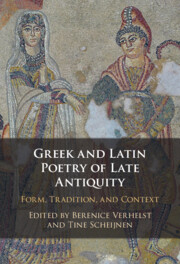Book contents
- Greek and Latin Poetry of Late Antiquity
- Greek and Latin Poetry of Late Antiquity
- Copyright page
- Contents
- Figures
- Contributors
- Introduction
- Part 1 A ‘Late’ Perspective on the Literary Tradition
- Chapter 1 Rivalling Song Contests and Alternative Typhonomachies in Ovid and Nonnus
- Chapter 2 Greek and Roman Epigrammatists in the Later Imperial Period
- Chapter 3 Allusion and Referentiality in Late Antique Epic
- Chapter 4 Speaking from the Margins
- Part 2 Late Antique ‘Genres’ and ‘Genre’ in Late Antiquity
- Part 3 The Context of Late Antiquity
- Bibliography
- General Subject Index
- Index Locorum
Chapter 2 - Greek and Roman Epigrammatists in the Later Imperial Period
Ausonius and Palladas in Dialogue with the Classical Past
from Part 1 - A ‘Late’ Perspective on the Literary Tradition
Published online by Cambridge University Press: 16 June 2022
- Greek and Latin Poetry of Late Antiquity
- Greek and Latin Poetry of Late Antiquity
- Copyright page
- Contents
- Figures
- Contributors
- Introduction
- Part 1 A ‘Late’ Perspective on the Literary Tradition
- Chapter 1 Rivalling Song Contests and Alternative Typhonomachies in Ovid and Nonnus
- Chapter 2 Greek and Roman Epigrammatists in the Later Imperial Period
- Chapter 3 Allusion and Referentiality in Late Antique Epic
- Chapter 4 Speaking from the Margins
- Part 2 Late Antique ‘Genres’ and ‘Genre’ in Late Antiquity
- Part 3 The Context of Late Antiquity
- Bibliography
- General Subject Index
- Index Locorum
Summary
The literary epigram is one of the most versatile ancient literary genres, and epigrammatists have often used it as a testing ground for the recollection and construction of their literary past. This chapter compares the corpus of Decimus Magnus Ausonius and Palladas of Alexandria, two eminent representatives of the epigrammatic genre from the later imperial period. Ausonius’ dialogue with the literary past is characterised by a discourse about the value, validity and reliability of classical authors and authorities from the Greek and the Roman world. For this purpose, Ausonius uses various techniques such as the juxtaposition of acknowledged and anonymous sources, the inclusion of ‘fake sources’, and a recurring discussion of Greek versus Roman authorities. In contrast, Palladas constructs a persona of himself which resorts to Greek authorities only and, especially, to Homer. Palladas appropriates Homer and the Homeric epics in order to construct his personal voice, whereas the actual discourse about classical authors and authorities remains comparatively flat and limited as compared to Ausonius.
- Type
- Chapter
- Information
- Greek and Latin Poetry of Late AntiquityForm, Tradition, and Context, pp. 31 - 50Publisher: Cambridge University PressPrint publication year: 2022



